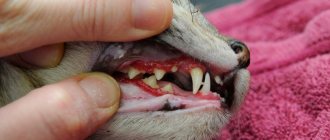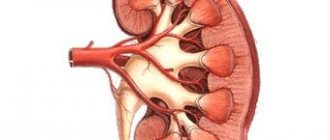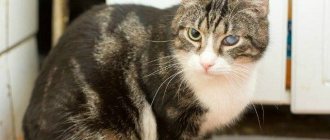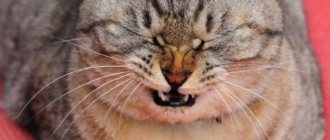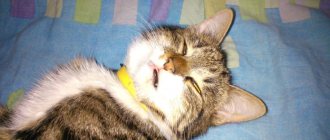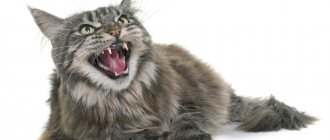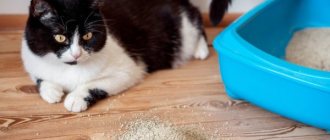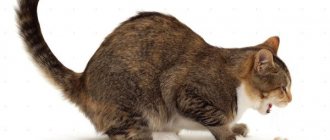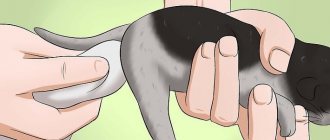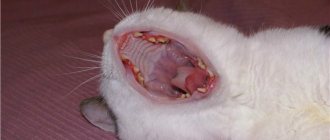The other day a kitten gave birth, the kittens are strong, she licked everyone and fed them. The next morning she began to drag them to another place, when I looked in on her, one kitten was lying listless with an open mouth, something white like colostrum was dripping from its mouth. Was he sleeping, is this normal, and what can I do to help him?
You can’t help newborns, but you can only harm them. The cat knows what to do. Just don’t disturb the cat, don’t bother her with her kittens again. She drags and hides the kittens, only because you didn’t take care of her shelter. She needs it now extra eyes are not needed. I always prepared a large box for the cat in advance. I placed soft fabric flooring inside. And not once did the cat try to hide the kittens. Your anxiety is quite understandable, but you also understand the cat. Because of your anxiety and fuss, she will constantly hide the kittens. Make her a “nest”, a place where she can sleep comfortably and feed the kittens. The cat will spend 90% of the time with the kittens for 10 days, while they are blind, she is guaranteed to care for them. And when the time comes for the cat she goes out to eat or go to the toilet, come up and quietly look at the kittens. Check how they are.
- Administrators
- 25,040 messages
- City: Moscow, metro station Slavyansky Boulevard
- Cats: Sweet couple Melissa and Marmalade
“Cats are mystical creatures sent to people as a consolation” (Yu. Terapiano)
This is how I write moderator comments
- City: Moscow, metro station Slavyansky Boulevard
- Cats: Sweet couple Melissa and Marmalade
Here are a couple more phone numbers of veterinary clinics that offer 24-hour consultations:
A kitten is clearly malnourished if it is inactive and does not gain weight.
“Cats are mystical creatures sent to people as a consolation” (Yu. Terapiano)
This is how I write moderator comments
Honorary Sonya of the Forum
- Males/cats: Serafima
- City: Moscow, metro station Slavyansky Boulevard
- Cats: Sweet couple Melissa and Marmalade
“Cats are mystical creatures sent to people as a consolation” (Yu. Terapiano)
This is how I write moderator comments
Here is a list of veterinary forums (there are specialists there who answer questions), otherwise you are not from Moscow and calling will be problematic.
- City: Moscow, metro station Slavyansky Boulevard
- Cats: Sweet couple Melissa and Marmalade
“Cats are mystical creatures sent to people as a consolation” (Yu. Terapiano)
This is how I write moderator comments
- City: Kursk
- Cats: Cornish Cat and Cornish Mouse
- City: Moscow, metro station Slavyansky Boulevard
- Cats: Sweet couple Melissa and Marmalade
How much is a lot? At this age, he should eat approximately 1 teaspoon per feeding (every 2-3 hours), which is 8-10 pipettes. If he eats, then all is not lost. try! You have to feed him every hour because he eats little at a time. How is his body temperature? Doesn't the cat reject him? After eating from a pipette, did you fall asleep?
When is a visit to the vet necessary: the most dangerous signs
Thus, sneezing in kittens may indicate the development of serious pathologies in the kitten’s body. But in what cases is a visit to the vet necessary? In situations where sneezing is accompanied by one or more of the following symptoms:
- Copious discharge (especially purulent) from the conjunctival cavity, development of ulcerations.
- Green or yellow discharge from the nasal passages.
- The animal is apathetic and does not respond to stimuli from the external environment.
- Increase in general body temperature.
- Producing large amounts of saliva (especially when it is white and flaky).
- Absence or significant deterioration of appetite, against the background of a significant increase in thirst.
- Swelling and tenderness of the subcutaneous lymph nodes.
- Wheezing, gurgling in the chest, persistent cough and other signs of damage to the respiratory system.
- Deterioration of the coat condition.
- Difficult and hoarse breathing.
- , other signs of damage to the digestive system.
If the kitten sneezes from time to time, but this is not accompanied by the signs described above, and the animal’s condition does not cause any concern, then you just need to monitor the pet for a couple of days.
If the sneezing does not stop, or the animal’s condition begins to worsen with the development of the symptoms described above, you should immediately call a veterinarian.
Diseases of internal organs
Due to weak immunity, Scottish Fold cats often suffer from internal pathologies. The list of diseases is long, but most often veterinarians diagnose four-legged patients with:
- cardiac and vascular disorders - arrhythmia, hemophilia;
- diseases of the digestive tract - inflammation of the stomach, liver dysfunction, intestinal obstruction,
- poisoning from poor quality food;
- pathologies associated with a weakened immune system - colds, viral infections;
- diseases of the kidneys and urinary system - urolithiasis, cystitis.
Treatment is carried out only by a veterinarian. Diagnosis cannot be delayed, since many of the listed diseases end in the death of the cat.
Signs of the development of internal pathologies in a Scottish pet:
- rapid weight loss or obesity;
- urinary incontinence;
- poor appetite;
- rapid breathing;
- dehydration;
- lethargy and drowsiness.
ATTENTION! Mostly neutered older Scottish cats are susceptible to urolithiasis.
The cause of kidney stones is a violation of protein and mineral metabolism in the body. However, there are factors that increase the risk of developing the disease.
These are genetic predisposition, infectious damage to the urinary organs, poor-quality and unbalanced diet, overheating of the body, pathological processes in the digestive tract, low mobility and obesity.
What to do at home
However, in many cases there is no need to urgently go to the clinic. Here's what to do at home to alleviate the condition of a pet whose sneezing is caused by non-infectious factors:
- When the air in city apartments is very dry, it will be useful (including for people) to use humidifiers.
- If a “feed” origin of sneezing is suspected, use hypoallergenic diets.
- It is very desirable to reduce the amount of household chemicals used when cleaning, replacing them with natural analogues.
But we would still recommend showing the kitten to a veterinarian first, since it is almost impossible to accurately determine the true cause of sneezing “on the knee.” A full medical examination in a clinical setting is required. Accordingly, clinical treatment will depend on the identified underlying cause.
Thus, bacterial infections are treated with antibiotic therapy, viral infections are treated with a combination of symptomatic treatment and the same antibiotics, but if there are foreign bodies in the respiratory organs, surgery may be required.
Prevention
Thus, prevention is designed to prevent the kitten from becoming infected with infectious pathologies:
- It is necessary to vaccinate pets in a timely manner and not to miss the revaccination deadlines set by the veterinarian.
- Use only high-quality feed.
- Use only those household chemicals, cosmetics and perfumes that are approved by allergists and dermatologists.
Sometimes kitten owners notice that their pet has begun to sneeze. A sneezing kitten may look very funny, but don't forget that sneezing is most often a sign of health problems. Why does a kitten sneeze and what to do about it?
If a kitten climbed under a closet, inhaled dust there and sneezed a couple of times after getting out from under the closet, then there is nothing wrong with that. But if the kitten sneezes or coughs constantly
If sneezing is accompanied by discharge from the eyes and nose or other unpleasant symptoms, you should sound the alarm and run with the kitten to the veterinarian.
The most “harmless” reason for sneezing in kittens is allergies.
. Yes, yes, animals, like us, are susceptible to allergic reactions. Allergens can range from dust, pollen, mold, chemicals (such as household cleaners, aerosols), cigarette smoke, and even cat litter. If a kitten is sneezing due to an allergy, you need to identify the allergen and eliminate it - then the kitten will stop sneezing.
But it often happens that a kitten sneezes due to more serious health problems. Thus, one of the most common causes of frequent sneezing in kittens is upper respiratory tract infections.
(bacterial, viral or fungal) and
some other diseases
. But in the case of infections, the matter is usually not limited to just sneezing. Other symptoms of upper respiratory tract infections may include discharge from the eyes and nose, fever, cough, and difficulty breathing.
Sneezing in cats can be one of the symptoms of chlamydia
. Like toxoplasmosis, chlamydia can be transmitted from a sick animal to humans. In addition to sneezing, chlamydia is usually accompanied by discharge from the nose and eyes, high fever, cough, and breathing problems.
Another disease that causes a kitten to sneeze is bordetellosis.
(“kennel cough”), a bacterial infection.
Symptoms of bordetellosis in older kittens include sneezing, coughing, nasal discharge, and fever. Sneezing in cats can also be a sign of mycoplasmosis
, an infectious disease. In this case, sneezing is accompanied by conjunctivitis and discharge from the eyes.
A very common disease in cats is infectious (herpesvirus) rhinotracheitis.
. A kitten with rhintracheitis sneezes, coughs, and has trouble breathing. Rhinotracheitis may be accompanied by rhinitis, conjunctivitis, purulent discharge from the nose and eyes, swelling of the mucous membranes of the nose, larynx and pharynx and other symptoms.
If your kitten sneezes and produces blood, you should immediately take it to the veterinarian. Sneeze with blood
means that the kitten's nasal passages are severely damaged. Damage and bleeding can be caused by various reasons: a foreign body stuck in the nasal passages, a fungal infection, or even cancer (nasal cancer or leukemia). Sometimes the discharge of blood when sneezing is caused by... sneezing! If a kitten sneezes too often, the nasal passages become irritated and the kitten sneezes with blood. In this case, you need to eliminate the root cause of the sneezing.
It is important to remember one thing: if a kitten sneezes, you cannot self-medicate!
Only a veterinarian can determine the cause of sneezing. If it is an allergy, he will determine the allergen, and if it is an infection, then based on the test results he will tell you which one it is and prescribe the necessary medications. There are a huge number of infectious diseases accompanied by sneezing; we have listed only a small part. Therefore, it is impossible to determine “by eye” why a kitten is sneezing.
Everyone sneezes from time to time, both cats and people. Single episodes of sneezing mean nothing and are common. But if this begins to repeat more and more often, a suspicion arises about the painful nature of the sneeze.
It is necessary to find out why your cat sneezes often. Common colds and allergies can also be hidden behind this. But it happens that a cat sneezes due to more serious health problems. Unfortunately, he cannot complain and talk about his feelings.
Why does a cat sneeze
One of the common factors that cause sneezing is common dust. Staying a pet in a dusty room causes irritation of the nasal cavity with dust particles, and the cat sneezes. But the process is not always harmless. The reasons why a cat sneezes can be serious and pose a threat to the health and life of the animal. These include:
Allergic reaction. The most common allergens are cat litter, household cleaning products, scented candles, perfumes and perfumes, and air fresheners. Allergies are often caused by mold and plant pollen. A cat may sneeze if kept in a smoky room, since cigarette smoke is a strong allergen and irritant. A reaction of this nature can be caused by the use of sprays and aerosols for disinfestation (extermination of insects) in a cat. In case of allergies, in addition to sneezing, the animal may experience other symptoms: itching, lacrimation.
Dental problems. Gum diseases and caries are accompanied by inflammation and cause sneezing in domestic cats. In this case, the process may be accompanied by bloody discharge, the animal eats poorly and loses weight.
One of the reasons why a cat often sneezes is polyps. Growths in the nasal cavity interfere with normal air circulation and make breathing difficult. In addition to sneezing, the animal experiences shortness of breath; the cat often sleeps with its mouth open.
Foreign body. This not harmless reason is often the cause of sneezing in a cat. Small foreign objects are removed during a natural physiological act; larger foreign bodies must be removed by a veterinarian immediately.
The reason why a cat sneezes for several days may be an infectious disease. Infectious rhinotracheitis, calcivirus - these diseases are often accompanied by a response. The herpes virus (the causative agent of infectious rhinotracheitis) affects the mucous membranes of the nasopharynx, which leads to sneezing. In addition to this symptom, a sick cat has a runny nose, high fever, cough, conjunctivitis. Calcivirus is also an infectious disease and is characterized by frequent sneezing of the animal, refusal to feed due to the formation of ulcers in the mouth, and damage to the joints. Sneezing can accompany diseases such as feline immunodeficiency virus, chlamydia, mycoplasmosis, and bordetellosis. These infections occur with increased body temperature, discharge from the eyes, and loss of appetite.
Often the reason that a cat sneezes is asthma, in which, in addition to multiple sneezes, there is difficulty breathing, wheezing, and attacks of suffocation.
Helminthic infestations: toxoplasmosis, dirofilariasis. With toxoplasmosis, the causative agent of which is microscopic parasites, sneezing, rhinitis, and fever are noted. Heartworm (heart parasites transmitted by mosquito bites) develops in the heart muscle and causes sneezing and asthma-like symptoms.
Oncological diseases. Cancer of the nasal passage is a rare, but the most serious cause of sneezing in a pet, threatening its life. In addition to this sign, the animal has loss of appetite, bad breath, apathy, and difficulty breathing.
Causes of sneezing
In cats, sneezing occurs due to various factors. The nature and mechanism of this phenomenon is no different in humans and animals. Most often, a cat sneezes due to irritation from mucous dust and allergies. This does not happen often and is normal.
But if the cat sneezes constantly, then you need to pay attention to this and try to eliminate the irritant. If this does not help, then you need to find out the reason.
Causes of frequent sneezing in cats
:
These are the main reasons why a cat may start sneezing. A veterinarian can determine the presence of these or other factors that cause a cat to sneeze frequently. Contacting a specialist is necessary, since it is easier to solve the problem at the beginning of its development.
It is also necessary to take into account what breed the animal belongs to. Many artificially bred cats have reduced immunity and altered facial anatomy. This can often be an explanation why a cat sneezes regularly, but does not have diseases or pathologies.
Genetic diseases
Scottish Fold cats are characterized by two genetic pathologies:
- osteochondrodystrophy;
- hemophilia B-type.
Osteochondrodystrophy will be discussed in detail below, and hemophilia B is a terrible consequence of the transmission of a mutant gene. The Scottish Fold cat has low blood clotting, which threatens heavy bleeding during wound formation or surgery.
Due to the lack of fibrin in the blood, the wound is not covered with a crust that blocks bleeding. The cat dies from blood loss.
Symptoms seen in a sneezing cat
If your cat sneezes frequently due to external irritants or exposure to allergens, then there will be no other symptoms. However, it also happens that at first the cat simply sneezes, and then other signs of deteriorating health are added.
These are the symptoms that accompany sneezing in cats.
:
- discharge from the nose and eyes;
- copious amounts of saliva;
- refusal of food and water;
- nose bleed;
- cough;
- breathing problems;
- aggressive behavior;
- increased anxiety;
- general weakness;
- inflammation of the mucous membranes.
When a cat sneezes, mucus comes out of his nose. By the nature of the nasal discharge, you can often determine whether your pet’s sneezing is due to a common cold, or whether the cause is a more serious condition. Cloudy discharge indicates the presence of an infectious disease.
Bloody signs may indicate the presence of polyps, oncology or other serious pathologies that cause the cat to sneeze. With allergies and colds, the mucus will be clear.
Associated symptoms
In addition to the main symptoms that accompany certain diseases, there are additional ones that will also indicate to the owner that the baby has health problems.
Here's what else you need to pay attention to if your kitten is sneezing continuously:
- tearing (sometimes pus may come out of them);
- swelling;
- shiver;
- excessive salivation;
- lack of appetite (the kitten eats very little or does not eat at all);
- green nasal discharge;
- loose stools;
- severe hair loss.
If you observe any of the symptoms listed above, it is better not to self-medicate, but try to get an appointment with a veterinarian as soon as possible. Only a specialist can make an accurate diagnosis and prescribe competent treatment.
How to help your pet and how to treat it
Only a qualified veterinarian can determine exactly what to do when a cat sneezes. You should not try to independently determine the diagnosis and prescribe treatment. When determining the causes of sneezing in a kitten or an adult animal, the doctor takes into account many different factors and prescribes tests and other tests.
In addition to a visual examination of the animal, the doctor will need additional information from the owner. It is necessary to inform the veterinarian about the age, weight of the pet, its temperature during the last 24 hours, and its daily diet. You may also need information about your last deworming (taking deworming pills), dates of vaccinations, and previous visits to medical care.
To determine the reasons why your cat often sneezes, you may need to take tests and undergo additional examinations. Usually, a clinical and general blood test, an analysis to detect a fungal or other infection, bacterial culture, and cytology are sufficient.
If significant pathologies are suspected that are causing the cat to sneeze, examination methods such as biopsy, endoscopy, computed tomography and x-ray may be prescribed.
The answer to the question “what to do if a cat sneezes” will depend on the results of the examination. The veterinarian will prescribe a course of treatment and determine its timing.
In some cases, your pet can be treated without taking medications. It happens that a cat constantly sneezes due to problems with the gums and teeth. It will be enough to eliminate this factor, and the sneeze will go away. Domestic cats need to take good care of their teeth. They need to be cleaned periodically using a special brush and paste.
If a sneeze is caused by mycosis, oral and external antifungal agents (tablets and ointments) are prescribed.
If there are viruses or infections, your pet should be given antibiotics. If the sneezing was caused by herpes, the cat is prescribed lysine-containing drugs.
In the presence of serious diseases (polyps, oncology), treatment is carried out in a hospital. A cat that often sneezes due to tumors needs surgical treatment and constant medical supervision.
In most cases, a cat that sneezes frequently does not need to be hospitalized at a veterinary clinic. Before returning home, you need to have detailed information about the treatment and care regimen for your pet. In the first days of treatment, a cat who is sneezing will need attention, care and care. It will be necessary to remove discharge from the nose and eyes. Any changes in the animal’s condition (positive or negative) require attention.
They must be reported to your doctor. A return visit to the veterinarian may be required.
Ear diseases
Due to the anatomical features of the ears, Scottish Fold cats often develop infectious and parasitic diseases. Short shells cannot reliably protect the organs of the inner ear from pathogenic microbes. Also, wax actively accumulates inside the curved ears.
Most often, Scottish Fold cats suffer from:
- deafness;
- otitis;
- ear tumors.
Signs indicating ear problems:
- the cat shakes its head;
- purulent or liquid discharge with an unpleasant odor pours from the ears;
- the skin of the ears is red and irritated;
- The pet intensively scratches its ears, tearing them until they bleed.
Treatment is prescribed only by a veterinarian. For prevention, you can buy cleansing ear drops at a pet store and regularly treat your animal’s ears with them.
Preventing sneezing
By sneezing, the cat tries to get rid of the irritant in the nasal cavity. This disturbs the animal and disrupts the usual rhythm of its life. If a cat sneezes frequently, this causes concern to the owners. Treating an animal requires a lot of time and money. In addition, visiting the veterinarian, undergoing tests and other procedures is a significant stress for the pet. Medicines can also harm your cat; they usually affect the liver and kidneys.
Therefore, cat owners need to comply with certain conditions under which the likelihood of sneezing is reduced:
- Carry out wet cleaning and vacuuming in the room where the cat lives.
- Don't smoke in front of the cat.
- Do not spray aerosols or perfumes around your pet.
- Limit the animal's contact with household chemicals.
- Regularly worm your pet and get the necessary vaccinations.
- Periodically clean the animal's nose, ears and teeth.
- Do not allow your pet to be in a cold room or in a draft.
Living under the same roof with our pets, we constantly monitor their behavior and general condition. Of course, every cat owner has watched their pet sneeze many times. Sneezing is a natural process caused by the body's attempt to get rid of particles of dust or dirt, hair in the nasal passages.
But what should you do if your kitten sneezes more often than usual? First you need to understand the reasons, and then eliminate the reason causing this action.
The most common cause of a kitten sneezing is a foreign object caught in the respiratory tract. If your kitten is constantly sneezing but cannot get rid of the irritant, you should get help. Examine the animal's mouth and nose for hairs and dirt. If found, remove it and the problem will quickly go away.
In addition to a natural attempt to clear the nasal passages of dust particles, sneezing can also be caused by other reasons, for example, allergic reactions of the body to some irritants. Try to monitor the frequency and conditions that cause your kitten to sneeze. This could be pollen, spices, lint, cigarette smoke, perfume or mold. To stop this reaction, you need to protect the animal from irritants. But often calculating them is not so easy.
First, remember what new things have appeared in the kitten’s environment, pay attention to the means that you used in his presence, or which he could get to on his own. Or maybe nothing new has appeared in the environment, but changes have occurred. So, for example, home or garden flowers could bloom. Sometimes completely unexpected items can be irritants - hygiene or pet care products, and even cat litter. Then you should stop using these products and wash the cat.
Sneezing can also be caused by viral or fungal diseases. Sneezing is a syndrome in almost all respiratory diseases. But usually such sneezing is accompanied by other symptoms: fever, vomiting, difficulty breathing, tearing, runny nose.
Another cause of pathological sneezing in a kitten can be asthma. It is very important not to miss the moment and seek help in time. You should not neglect your pet’s health by postponing treatment until later, in the hope that everything will go away on its own. If you notice that your kitten is sneezing more and more often than usual, and the irritant cannot be found, contact your veterinarian immediately. The specialist will find out the cause of the disease and prescribe effective treatment.
Such a cute creature, like a kitten, can bring its owners a lot of positive emotions and smiles. And suddenly they see the kitten sneezing, but the reasons for this remain unknown. Of course, this looks very funny, but in fact it may mean that the kitten is sick and needs help. Let's figure out what to do if a kitten sneezes, what to do in such cases?
Kitten sneezes: causes of the problem
There can be many reasons for a kitten sneezing. Let's look at the most common options.
1. Dust. The simplest cause of sneezing may be dust. So, once dust particles get into the fluffy’s nose, they can cause irritation. The pet will begin to sneeze to relieve it of the irritant. This reaction is natural and there is nothing wrong with it.
2. Allergies. If the kitten begins to sneeze not periodically, but all the time, the cause may be an allergy. The fact is that kittens are very susceptible to allergic reactions, and the allergens can be completely different. So, their role can be food, cleaning products, indoor plants, hygiene products for animals and much more.
3. Asthma. By ignoring allergies in a small pet, owners risk that a protracted illness can turn into a complex chronic disease. So, if you are faced with the fact that a kitten has been diagnosed with asthma, first of all you should remove all possible allergens from the house. Also try to protect your pet as much as possible from perfumes, all kinds of candles or scented candles. So, in case of severe asthma attacks, veterinarians recommend the following steps: prepare a steam bath and hold the kitten over it for several minutes. This procedure will help to somewhat improve his condition and restore his airways.
4. Vaccination. Every breeder who cares about the health of their miniature pets knows about the importance of vaccination. However, it often happens that it is the vaccine, or more precisely, the reaction of the kitten’s immune system, that is the reason for its incessant sneezing. So, if you do not observe the timing between the first and second vaccinations, such a reaction happens quite often and you should not be surprised at its occurrence.
5. Infections. Every pet always has a chance of getting a bacterial, fungal or viral infection at any time. These diseases, in addition to sneezing, are also characterized by the presence of cough, runny nose, and high fever.
6. Dental diseases. Every inflammation that occurs in the oral cavity travels through the nasal canals in just a couple of hours. This situation can be the main reason for the cat’s incessant sneezing.
7. Helminthic infestations. Some types of worms are quite dangerous and can affect the heart and lungs of an animal. They can block arteries, which creates breathing problems, causing the kitten to cough and sneeze. If the appearance of worms is not detected in a timely manner, this can lead to the death of your beloved pet.
Asthma in four-legged animals
Asthma is a disease that occurs not only in humans. Veterinarians and pet owners are increasingly encountering this disease. Asthma in a chronic state against the background of provocateurs (tobacco smoke, pollen from flowering plants, fluff, dust, chemical sprays and even the banal smell of the housewife or owner’s perfume) can cause an attack accompanied by sneezing and coughing, when the animal finds it difficult to breathe normally.
The first aid in such a situation will be the following: take the cat and hold it for several minutes over hot steam, but not boiling water! Do this very carefully: do not burn the animal. Hold the cat tightly: the animal may escape and accidentally scald you and itself. It will be safer if you use a steam inhaler. This treatment will help open the passages in the bronchi and stop an asthma attack in your pet.
Even a one-time asthmatic attack requires consultation with a veterinarian so that he can prescribe the appropriate medications for the animal to treat the disease.
The kitten is sneezing: what to do, how to cure it?
Before getting a kitten, it is recommended to thoroughly clean your home. Try to remove all dust in the room, outdated items with scuffs, especially tablecloths and scuffs; it is recommended to lay out clothes and hang them in closets.
When your new pet arrives at home, first of all, observe its behavior. Most often they start by walking around and sniffing the area around it. So, if you see how an animal, approaching another thing, suddenly begins to sneeze and snort, it should be removed as far as possible.
After you establish the true cause of sneezing, you must first begin symptomatic treatment. However, it is not recommended to do this yourself, since these can be quite serious diseases, such as toxoplasmosis, microplasmosis or leukemia. What is the best way to proceed in this case, it is better to ask your veterinarian.
During a child’s illness, it is necessary to provide him with everything he needs: food, warmth, peace. If the cause of his suffering is damage to the respiratory tract, try to provide the animal with all the necessary assistance: help in cleaning the nose, discharge from the eyes, and regularly inspect its mouth and throat. It is also recommended to add as many readily available components and vitamins to his diet as possible.
If you observe a kitten constantly sneezing, and its allergy does not go away, but causes its condition to worsen, you should show it to a specialist as soon as possible. You should not hesitate to do this, the faster he is delivered to the veterinary clinic, the faster he will be healed, fortunately, today the abundance of high-quality and affordable drugs allows you to do this without much effort.
My cat sneezes and snorts. What's the matter? General information
Sneezing and snorting seem like obvious enough signs to identify, but it's not always easy to tell them apart in pets. Indeed, these two symptoms can sometimes appear so that many people use the terms interchangeably. Sneezing is usually defined as a sudden, involuntary movement of air from the lungs through the nose and mouth. This phenomenon usually occurs in response to some irritant of the upper respiratory tract, most often to the thin receptor structures of the mucous membrane that lines the nasal passages.
A snort, on the other hand, looks and is identically defined as a sneeze. The difference is that sneezing is involuntary, while snorting is a voluntary effort on the part of the pet.
Dogs and cats sneeze and snort for a variety of reasons related to the functioning of the upper respiratory tract. While many are normal and benign reactions to simple irritation, some may signal infections, upper airway obstructions, and allergic diseases. There are also other pathological conditions of the upper respiratory tract.
The kitten is sneezing: what to do, preventive measures
Disease prevention is quite simple: pay as much attention as possible to your pet and constantly monitor its health. Do not forget that kittens do not have such a strong immune system, so many of them can react painfully even to conditions that are similar to adult cats.
Therefore, make sure that there are fewer drafts in the apartment, limit to a minimum the contact of a fragile baby with other sick animals and, of course, do not forget to vaccinate your pets on time.
